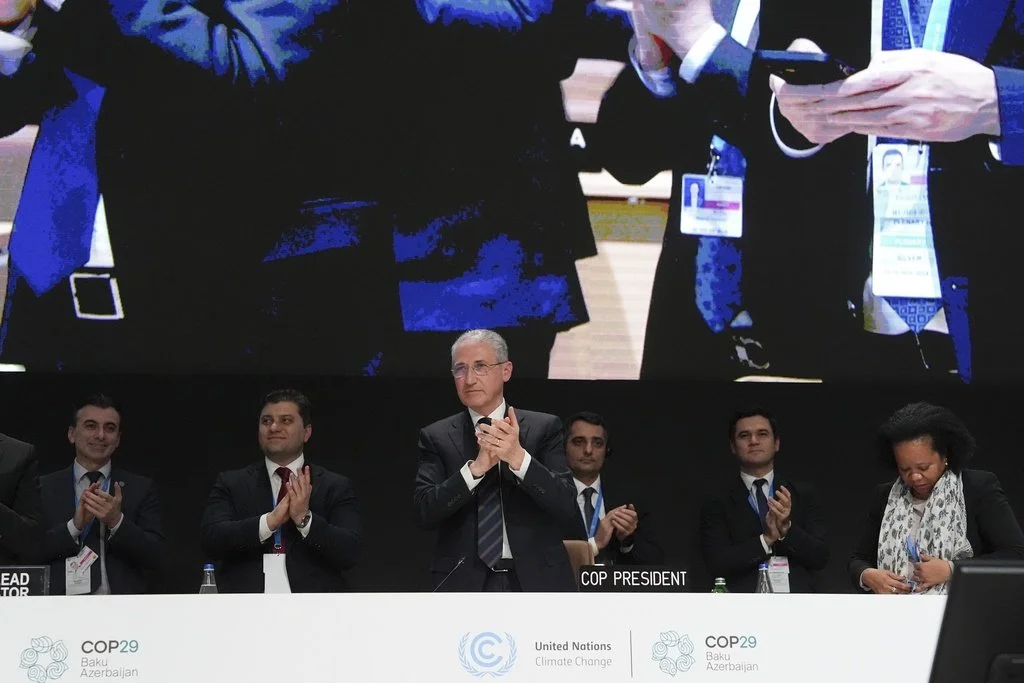COP29 Climate Summit Funding Deal Falls Short of Meeting Developing Nations’ Needs to Combat Climate Change
COP29 President Mukhtar Babayev (center) and other representatives applaud during the U.N.’s annual conference closing plenary session. (Photo: AP Photo/Joshua A. Bickel).
On Sunday, Nov. 24, 2024, the 29th United Nations Climate Change Conference (COP29) in Baku, Azerbaijan, reached an agreement to fund developing nations’ efforts to adopt clean energy and combat climate change through 2035. The deal pledges $300 billion annually from wealthy nations and aims to raise an additional $1.3 trillion annually through private and public resources by 2025. This agreement builds on a 2009 commitment from the world’s wealthiest nations — often the largest contributors to climate change — to provide $100 billion annually to developing nations by 2020, a goal that was met two years behind schedule. At COP29, the debate over funding remained contentious, with the final deal emerging nearly 30 hours after its intended deadline.
While the deal pledges an annual $300 billion from wealthy nations, it falls drastically short of the funds required to aid developing nations. The Group of 77, UN’s coalition of developing countries, had called for $500 billion, significantly more than the agreement’s final amount. Leela Nandan, an Indian representative, criticized the fund as a “paltry sum” and that the amount is “abysmally poor.”
While these funds are intended to support the development of clean energy, they are unrealistic for nations already experiencing severe damage from climate change — damage caused by the very nations now funding these efforts. Although smaller nations contribute only a fraction of global emissions, they bear a disproportionate burden in addressing its effects. Cedric Schuster, chair of the Alliance of Small Island States, said, “Our islands are sinking. How can you expect us to go back to the women, men, and children of our countries with a poor deal?”
Climate activists protest at the COP29 U.N. Summit. (Photo: AP Photo/Sergei Grits).
Additionally, the promise to raise extra funds through private and public means to cover the billion-dollar gap has faced criticism as an attempt by wealthy nations to shift responsibility. More than 1,700 representatives from fossil fuel organizations attended the summit, outnumbering most nations’ delegations. A Greenpeace delegate described the agreement as protecting “reckless nature destroyers.”
Moreover, the outcome of the US presidential election complicated negotiations. Donald Trump, a climate change denier, was elected the 47th president and will begin his second term in January 2025. As the world's largest economy, the US is often viewed as a critical contributor to climate agreements and financial pledges. Fearing that Trump might withdraw from this agreement — similar to his exit from the Paris Agreement in 2019 — many nations were hesitant to reach a deal, uncertain about American contributions. As University of Cambridge professor Joanna Depledge told the BBC, these countries “are acutely aware that Trump will not pay a penny and they will have to make up the shortfall.”
Regardless of US contributions, especially during the Trump administration, the agreement is viewed as a disappointment by climate activists and developing nations that are desperate for funds. Countries like China and Saudi Arabia, major contributors to climate change, are classified as developing nations under the UN and are not required to contribute to the funding, though they are “invited to.” Western nations, meanwhile, face criticism for failing to fully meet their pledges from the 2009 deal.
While the funding approved at the COP29 Summit is a step toward combating climate change, it falls short of the expectations of many developing nations and activists. Those least responsible for climate change are now left to shoulder the financial burden of addressing the substantial funding gap, while wealthier nations avoid greater accountability. The COP29 deal must serve as a foundation for future international efforts to effectively address climate change.


